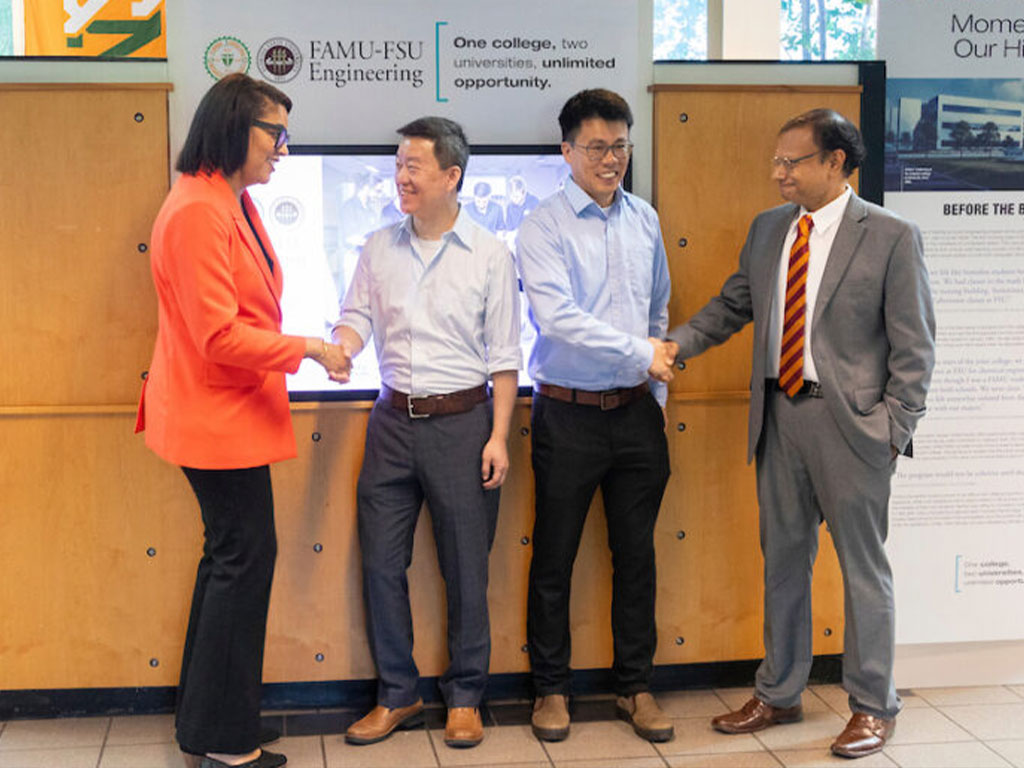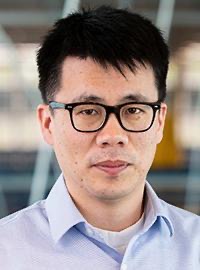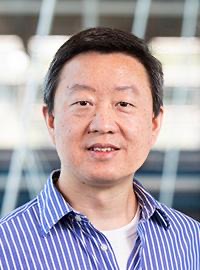Two Researchers Each Awarded $5M National Science Foundation Grant For Quantum Science Research

Two FAMU-FSU College of Engineering professors have each been awarded $5 million National Science Foundation (NSF) grants to pursue quantum science research. The funds were awarded to the joint college through Florida A&M University.
“These two grants involving various aspects of quantum information, quantum engineering, quantum computing, and quantum materials, have thrust the FAMU-FSU College of Engineering and FAMU STEM into the forefront of arguably the most exciting field of modern science—quantum states and quantum dynamics,” said FAMU Vice President for Research Charles Weatherford, Ph.D. “quantum states and quantum dynamics have been known for over one hundred years and we likely have only sampled the possibilities of quantum reality.”
Bayaner Arigong, Ph.D., assistant professor of electrical and computer engineering in the FAMU-FSU College of Engineering, is the principal investigator for the “Developing Quantum Information Science and Engineering Research and Education Program at FAMU” grant, worth $5 million over five years.

“The main goal of this project is to build a research and education program in the broad areas of quantum information science and engineering at FAMU and the joint college with strong support from the University of Chicago and Florida State University,” Arigong said. “Through this grant, we will develop a novel quantum integrated chip, a new quantum experimental training platform, and infrastructure to support research activities, education, and workforce development locally and eve across Minority Serving Institutions (MSIs) and Historically Black Colleges and Universities (HBCUs) in the U.S.”
The nature of quantum dynamics enables analog parallel processing, which shows great potential to break through all the limitations of current digital hardware-based computing systems in scientific computing, big data, artificial intelligence, sensing, communication, wireless systems, and more.
“This fantastic grant takes us to the next economy based on quantum sensing, quantum communications and quantum computing. It will transform our economy, not only in this nation but in the world—and we are leading it. That’s the fundamental truth about these grants and being supported by the National Science Foundation at this level, which allows us to build capacity at the college,” said FAMU-FSU College of Engineering Dean Suvranu De, Sc.D.
Wei Guo, Ph.D., professor of mechanical engineering at the college, is the principal investigator for the second funded research project, “Quantum Fluids and Solids as Platforms for Quantum Science and Engineering.”

Guo said his research leverages unique quantum fluids and solids to explore and advance emerging qubit platforms, optomechanical sensors, and quantum interference devices, each poised to make significant contributions to the understanding and application of quantum mechanics.
“Our proposed work represents a transformative effort to position FAMU at the forefront of Quantum Information Science and Engineering (QISE), a rapidly advancing field with profound implications for technology and society. By integrating cutting-edge research with innovative educational initiatives, the project seeks to address the urgent national demand for engineers proficient in quantum technologies,” Guo said. “Through strategic collaborations with leading experts and access to state-of-the-art facilities, this project not only aims to drive regional and national advancements in quantum research but also to build a diverse and highly skilled quantum workforce. The multifaceted approach of this proposal is designed to ensure the sustainability and impact of QISE research and education, ultimately positioning FAMU and the joint college as leaders in this critical area of science and technology.”
The awards are part of NSF’s $39 million investment to help grow quantum research activities at more institutions across America through the NSF Expanding Capacity in Quantum Information Science and Engineering (ExpandQISE) program.
This investment will fund 23 research projects aiming to break new ground in fields such as quantum computing, sensors and materials. The funding will directly support research, training and educational activities through partnerships between established QISE programs at research-intensive institutions and up-and-coming programs at institutions seeking to build their quantum research and development infrastructure, according to the NSF.
The agency developed the ExpandQISE program in support of priorities outlined in the “2018 National Quantum Initiative Act,” which was enacted to accelerate quantum research and development for the long-term economic and national security of the U.S. ExpandQISE aims to accelerate quantum-focused research by reducing barriers to participation and increasing the diversity and breadth of U.S. institutions doing that research.
“Maintaining our country’s global leadership in quantum information science demands that we engage the full spectrum of talent that’s waiting to be unleashed from each and every U.S. community,” said NSF Director Sethuraman Panchanathan. “The NSF ExpandQISE program is simultaneously strengthening the quantum workforce and investing in the scientific and technological advances that will be the foundation for a quantum-enabled future.”
FAMU Provost/Vice President for Academic Affairs Allyson Watson expressed pride in the work of the faculty members who secured the grants and was optimistic about the breakthroughs ahead.
“This support will empower them to lead advancements in quantum technologies and inspire our students in groundbreaking scientific exploration,” Watson said.
The educational components aim to develop new courses, professional skills training and outreach activities for workforce needs in current and future QISE and STEM. The collaborative research and education effort enables faculty members in multidisciplinary areas to conduct high-end research and students to pursue a career in QISE and STEM.
Back to Stories

